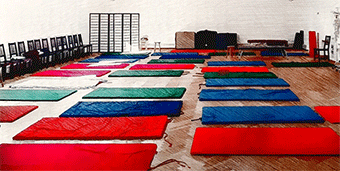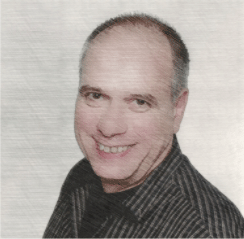
Moving training online

Back in March, I had an online conversation with Patrick Gruner. Patrick’s a fellow trainer and a longtime friend and colleague. We met back in the 1990s when I was the guest trainer for one of Mark Reese’s training in Germany. Patrick, who was a newly-minted Feldenkrais® teacher, was the co-administer of that training. We shared a common background as Neuro-Linguistic Programming trainers, which made for many inspiring, insightful exchanges.
The conversation we had this spring took place after my webinars about using virtual meetings to foster distance learning. The effects of the pandemic were taking their toll and Patrick had a training segment starting the following week. Following the shelter at home requirements that the German government had recently imposed, that segment moved online. We talked about what I’d learned about teaching online and how that might be useful for him. (If you’re curious about what we discussed, here are the links to that conversation: audio MP3 and video MP4.)
 Recently, I learned that Patrick has taught six different training groups since that conversation. The segments spanned all four years of the training calendar; indeed, he even held one graduation online.
Recently, I learned that Patrick has taught six different training groups since that conversation. The segments spanned all four years of the training calendar; indeed, he even held one graduation online.
This piqued my interest because, later this month, I am the guest trainer at the current training in Melbourne, Australia, which is co-directed by Susan Hillier and Zoran Kovich, and then next month, I will be fulfilling the same role for the teacher training in Lyon, France, directed by Christine Barrat. I’m more than a little bit curious about what my pal Patrick has been learning from teaching all these training groups!
That is why I asked Patrick if he’d be interested in talking. Thankfully, he agreed to discuss What happens when Feldenkrais training moves online? If you’re curious to find out what worked well, what didn’t, and how he’ll be incorporating what he found in future training programs — both virtual and actual — I invite you to join our live online conversation next Monday, 13 July 2020, at 10:00 AM Pacific. Please click here to sign up now.
So you know, the link to the meeting is displayed on the Thank-you page after you sign up; you’ll also receive an email with that information. (If you’re located in another time zone, you can find out when we’ll be meeting by clicking here.)
During this webinar, we’ll build on what we talked about last time and on our decades of discussing and implementing the art and science of iterative curriculum design. There will be time for questions and answers and for discussion.
Whether you can attend at this time or not, please sign up for the meeting so that we can let you know when the replay will be available and how to access it.
There’s absolutely no charge to sign up for this webinar. We make it available as part of our commitment to fostering a community of practice for Feldenkrais trainees, teachers, assistant trainers, and trainers. That being said, all of us here at Mind in Motion are most grateful for any donation you can make to defray the costs of broadcasting, recording, and making available the recordings afterward. (You will have a chance to contribute after signing up for the meeting.)
 On alternate Monday mornings this summer, my former doctoral advisor, Gary Riccio, Ph.D., and I are conducting an online webinar called A feeling for gravity, in parallel with The Human Frame, the 2020 Awareness Through Movement® Summer Camp.
On alternate Monday mornings this summer, my former doctoral advisor, Gary Riccio, Ph.D., and I are conducting an online webinar called A feeling for gravity, in parallel with The Human Frame, the 2020 Awareness Through Movement® Summer Camp.
In these conversations, we explore movement science, neurophysical learning, and the interplay between orientation, balance, and coordination. The topics range from what we can learn from the results of sensory psychology experiments, from perspectives such as Ecological psychology and cybernetics, and, especially, from applying these abstract, academic notions to improving our personal lives and professional practices.
Whether you are practicing body-based learning for yourself or with others, whether you are an experienced scientist or lack a university background, you are invited to join us for our live Zoom meetings. We welcome questions and make sure to leave time for you and others to be part in the dialogue. If it isn’t possible for you to attend, we make the recordings available.
- To access the recordings of our past webinars and to sign up for the upcoming ones please click here.
- If you haven’t signed up for your free MIMO account, please click here.
Your thoughts?
Please let us know your perspective! Add your comments, reactions, suggestions, ideas, etc., by first logging in to your Mind in Motion account and then clicking here.
Commenting is only available to the Mind in Motion Online community.
Join in by getting your free account, which gives you access to the e-book edition of Articulating Changes (Larry's now-classic Master's thesis), ATM® lessons, and more — all at no charge whatsoever.
To find out more and sign up, please click here.
Please share this blog post
 This work is licensed under a Creative Commons Attribution-ShareAlike 4.0 International License
This work is licensed under a Creative Commons Attribution-ShareAlike 4.0 International License
This blog may contain one or more affiliate links. When you click on a link and then make a purchase, Mind in Motion receives a payment. Please note that we only link to products we believe in and services that we support. You can learn more about how affiliate links work and why we use them here


Responses